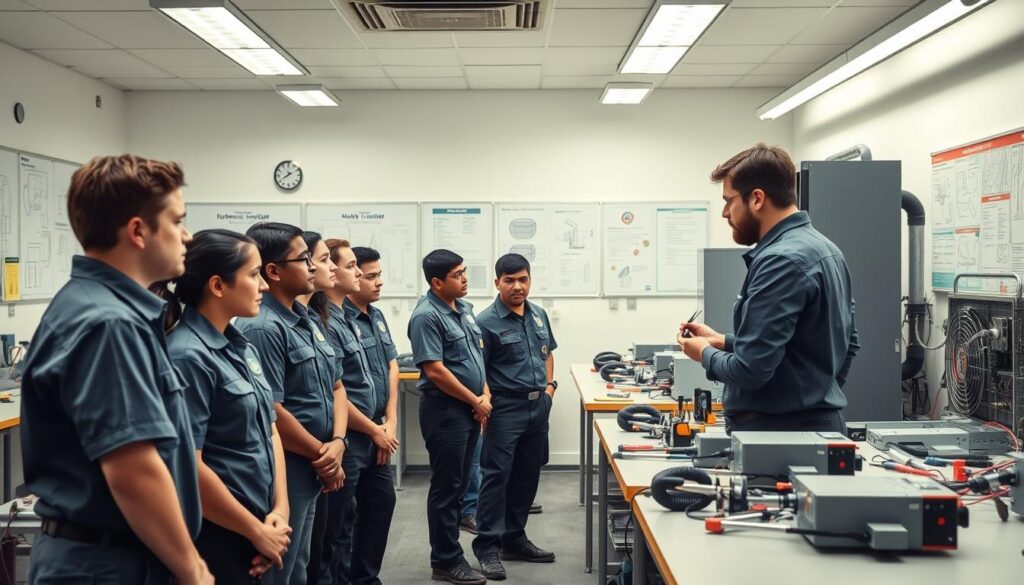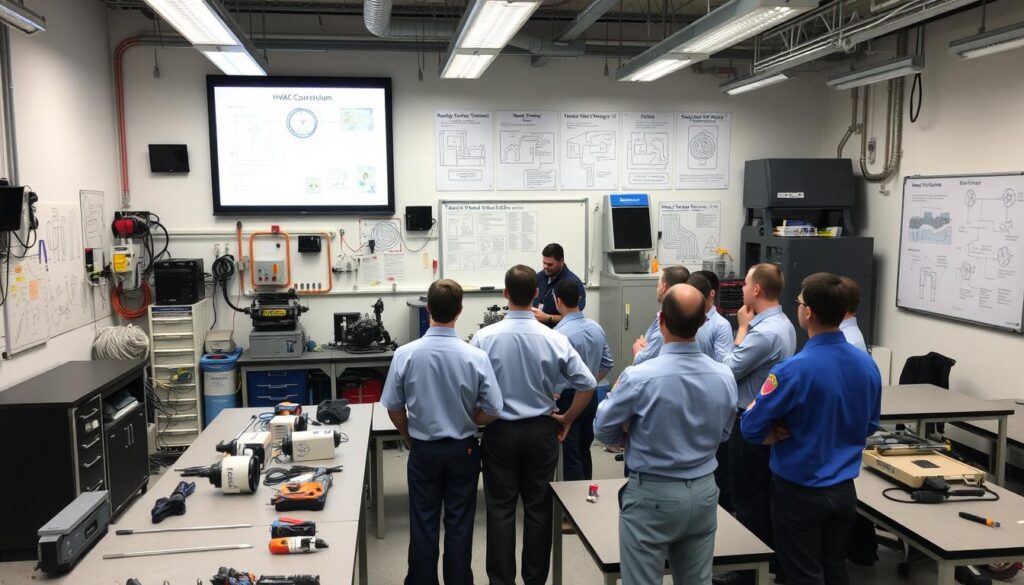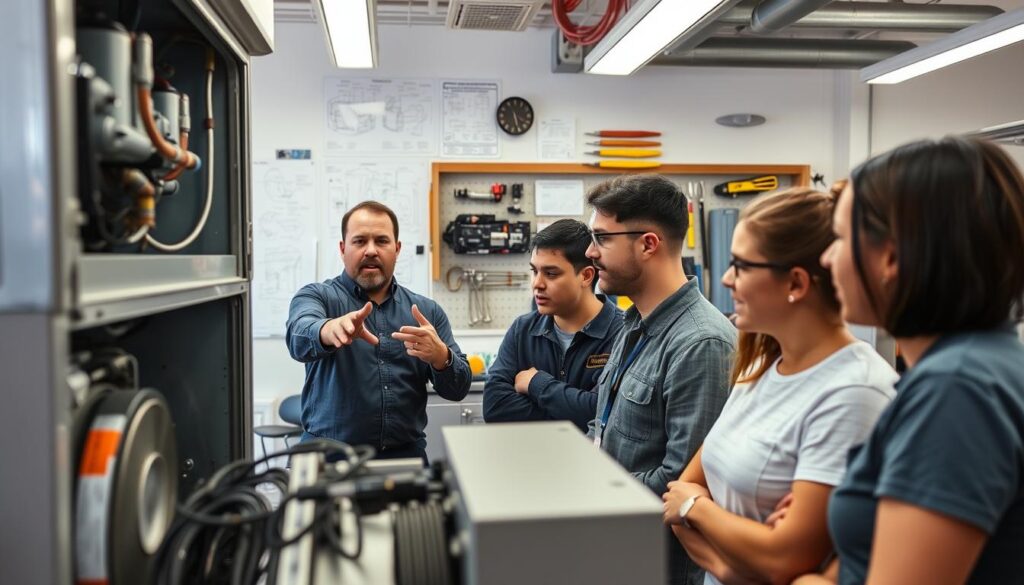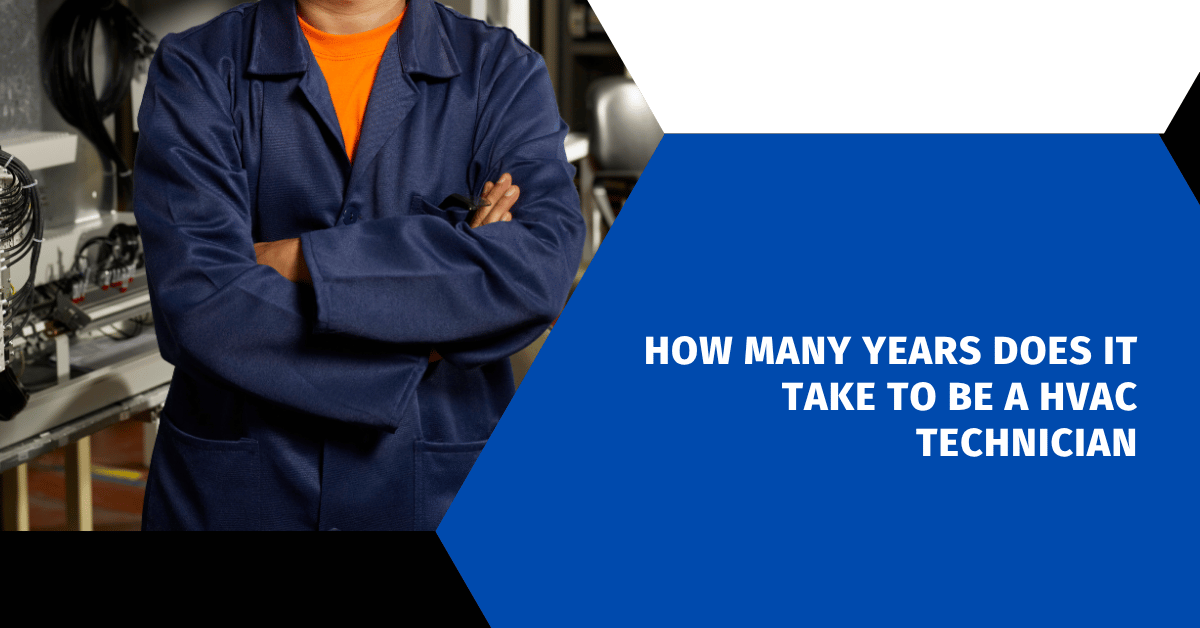Affiliate Disclosure
HVAC Guide Guys is a participant in the Amazon Services LLC Associates Program, an affiliate advertising program designed to provide a means for sites to earn advertising fees by advertising and linking to Amazon.
How Many Years Does It Take to Be a HVAC Technician? Are you curious about how long it takes to become a HVAC technician? It’s not just about time. It’s about finding the right path that fits your goals and learning style.

Exploring how many years it takes to become a HVAC technician, you’ll find different training options. Your training can last from 9 months to 5 years, depending on your choice. Each path has its own benefits for those wanting to start a career in HVAC.
Whether you prefer quick vocational programs or detailed apprenticeships, knowing the training options is key. It helps you decide on your future in heating, ventilation, and air conditioning.
Key Takeaways
- HVAC technician training varies from 9 months to 5 years
- Multiple educational pathways are available
- Choose a training option aligned with your career goals
- Practical experience is key in HVAC education
- Certification boosts your professional standing
Table of Contents
Understanding Different HVAC Training Pathways
Starting a career as an HVAC technician has many educational paths. Each one offers unique benefits and learning chances.
Those interested in HVAC have three main training options. Each has its own advantages and challenges for those entering this field.
Trade School Programs
Trade school programs are quick ways to get into HVAC. They last from 9 months to 2 years. You get detailed technical lessons.
- Focused curriculum on HVAC systems
- Hands-on technical training
- Industry-recognized certifications
- Faster entry into the workforce
Apprenticeship Programs
Apprenticeships mix classroom learning with real-world experience. They last 3-5 years. You get paid while learning from experts.
| Program Component | Details |
|---|---|
| Classroom Hours | 144 hours annually |
| Practical Training | 2,000 work hours per year |
| Total Program Duration | 3-5 years |
On-the-Job Training Options
Some HVAC companies train you directly. This way, you learn while earning and gaining experience.
- Direct mentorship from experienced technicians
- Immediate practical skills development
- Potential for faster career advancement
- Limited structured educational components
Explore Our HVAC Shop
Looking for top-rated HVAC tools, parts, and accessories? Visit our shop and find the perfect solution for your needs.
Visit the ShopHow Many Years Does It Take to Be a HVAC Technician
Becoming an HVAC technician takes different paths with varying lengths of training. Your path to a career in heating, ventilation, and air conditioning can vary. It depends on the route you choose.
Knowing how long HVAC training takes helps you plan your career. Let’s look at the main educational paths:
Vocational School Programs
HVAC vocational training is the quickest way to start. These programs usually last:
- 9 months for certificate programs
- 1-2 years for more detailed diplomas
- Flexible hours for part-time students
HVAC Apprenticeship Options
An HVAC apprenticeship gives you deep hands-on learning. These programs need a big time commitment:
- 3-5 years of structured training
- Classroom and practical work mix
- Earn while you learn
College Degree Programs
College degree programs offer deep technical knowledge. They provide extensive HVAC education:
- 2-year associate degrees
- 4-year bachelor’s degree options
- Specialization opportunities
Your choice depends on your goals, time, and career dreams in the HVAC field.
Essential Skills and Knowledge Requirements
To be a top HVAC technician, you need to master many skills. Your education will teach you the key skills for success in the HVAC world.
Technical skills are at the heart of your job. You’ll learn about:
- Refrigeration system diagnostics
- Electrical system troubleshooting
- Heating and cooling equipment maintenance
- Advanced climate control technologies
HVAC certification needs you to be good at both technical skills and thinking critically. Your training will focus on solving problems fast and efficiently.
| Skill Category | Key Competencies | Importance Level |
|---|---|---|
| Technical Knowledge | System diagnostics | High |
| Mechanical Skills | Equipment repair | Critical |
| Customer Service | Communication | Essential |
But it’s not just about technical skills. You also need soft skills like good communication and customer service. These skills help you provide top-notch service.
Being an HVAC technician means always learning and staying up-to-date. Keep learning about new technologies and best practices to stay ahead in this fast-changing field.
Explore Our HVAC Shop
Looking for top-rated HVAC tools, parts, and accessories? Visit our shop and find the perfect solution for your needs.
Visit the ShopHVAC Educational Curriculum Overview
Getting to know the HVAC curriculum is key for those starting their HVAC journey. You’ll follow a structured path filled with technical knowledge and hands-on skills.

Core Technical Subjects
HVAC programs cover essential technical subjects. These subjects are the base of your HVAC career. You’ll learn about:
- Thermodynamics and heat transfer principles
- Refrigeration cycle and system design
- Electrical theory and circuit analysis
- Mechanical system diagnostics
- Advanced climate control technologies
Hands-on Training Components
Hands-on training is vital for HVAC certification. Your training will focus on real-world skills through immersive experiences. You’ll learn:
- Equipment installation techniques
- Troubleshooting complex HVAC systems
- Precision measurement and calibration
- Comprehensive system maintenance protocols
Safety and Regulatory Education
HVAC pros need to know safety standards and regulations. Your curriculum will cover:
- OSHA workplace safety guidelines
- EPA environmental regulations
- Local and state building code compliance
- Environmental protection standards
This education makes you a skilled, knowledgeable, and responsible HVAC pro. You’ll be ready to thrive in the HVAC industry.
Certification and Licensing Requirements
Getting into HVAC can be tough, with different rules for each state. It’s key to know what your state needs for HVAC licensing.
Most states require HVAC techs to be licensed. This ensures they are safe and skilled. The steps to get certified include:
- Completing an approved HVAC training program
- Getting the needed work experience
- Passing licensing exams
- Getting specific industry certifications
Some important certifications are:
- EPA Section 608 Certification: Needed for working with refrigerants
- NATE (North American Technician Excellence) certification
- State-specific trade licensing exams
The cost and effort to get licensed vary by state. In California, for example, you need 6,000 hours of apprenticeship and pass a tough state exam. Some states are easier, while others ask for lots of proof of your skills.
Having professional certifications can really help your career. Employers like to see more than just a basic license. It shows you’re serious about your job and want to keep learning.
Pro Tip: Always check your state’s specific HVAC certification requirements to ensure you meet all necessary qualifications.
Explore Our HVAC Shop
Looking for top-rated HVAC tools, parts, and accessories? Visit our shop and find the perfect solution for your needs.
Visit the ShopCareer Opportunities in HVAC Industry
The HVAC industry has many exciting career paths for those starting out. Your journey can take you through various sectors and specializations. Knowing the growth and roles available helps you choose the right path for your education and career.
Entry-Level Positions
Most HVAC careers start with entry-level technician roles. These jobs give you hands-on experience and basic skills. You’ll do things like:
- Installing and maintaining residential HVAC systems
- Performing routine equipment inspections
- Diagnosing basic system malfunctions
- Assisting senior technicians with complex projects
Advanced Career Paths
With more experience, you can move into specialized and leadership roles. These advanced positions include:
- Lead Technician
- Service Manager
- Project Supervisor
- Technical Sales Representative
Specialization Options
Specializing in certain areas can lead to higher pay and interesting challenges. Your education can open doors to:
| Specialization | Focus Area | Potential Industries |
|---|---|---|
| Commercial HVAC | Large-scale system design | Office complexes, hospitals |
| Industrial Refrigeration | Complex cooling systems | Food processing, manufacturing |
| Green Technology | Sustainable energy solutions | Solar thermal, geothermal |
Continuous learning and professional development are key to advancing your HVAC career. Stay updated with the latest technologies and certifications to maximize your career growth.
HVAC Technician Salary Expectations
Thinking about becoming an HVAC technician? It’s important to know what you might earn. The salary for HVAC technicians changes a lot based on several key factors.
What affects HVAC salaries includes:
- Where you live
- How long you’ve been working
- Any special certifications you have
- The type of industry you work in
Your career path in HVAC can really affect how much you make. New technicians usually start with lower pay. But, those with more experience and special skills can earn more.
| Experience Level | Average Annual Salary | Potential Range |
|---|---|---|
| Entry-Level | $35,000 – $42,000 | Varies by region |
| Mid-Career | $45,000 – $65,000 | Increases with specialization |
| Experienced Technician | $65,000 – $85,000 | Top performers earn more |
Pro tip: Investing in continuous education and specialized certifications can significantly boost your earning in the HVAC industry.
Recent data shows HVAC technicians in places like California, New York, and Texas often make more. This is because there’s a big demand and complex climate needs.
Explore Our HVAC Shop
Looking for top-rated HVAC tools, parts, and accessories? Visit our shop and find the perfect solution for your needs.
Visit the ShopBenefits of Formal HVAC Training Programs
Choosing a formal HVAC technician education path offers big advantages. It can kickstart your career in the heating, ventilation, and air conditioning industry. Professional hvac vocational training gives you more than technical skills. It opens doors to a world of opportunities and professional growth.

Formal HVAC training programs offer benefits that go beyond classroom learning. Your hvac training duration is an investment in your future success.
Industry Connections
Professional training programs create strong networking opportunities. They partner with local businesses and industry leaders. You’ll get:
- Direct connections with employers
- Guest lectures from HVAC experts
- Industry workshops and seminars
- Mentorship opportunities
Career Support Services
Comprehensive HVAC technician education includes more than technical training. These programs offer strong career support services. They prepare you for professional success with:
- Professional resume writing assistance
- Job placement resources
- Interview preparation workshops
- Career counseling
Practical Experience Opportunities
Your hvac vocational training includes hands-on experiences. These simulate real-world work environments. You’ll get to:
- Work with modern HVAC equipment
- Develop technical problem-solving skills
- Build a professional portfolio
- Gain confidence through supervised practice
Investing in a formal HVAC training program can significantly accelerate your career trajectory. It gives you a competitive edge in the job market.
Conclusion
Looking into how long it takes to become a HVAC technician shows many paths. You can choose from 9 months in vocational programs to 4-year college degrees. Each path has its own benefits, fitting your goals and learning style.
The HVAC career offers great chances for those ready to learn. You can go to trade school, do an apprenticeship, or get a degree. All these ways teach you the skills and hands-on training needed to thrive in this field.
Choosing your education wisely is key. Think about the time, money, and career goals you have. HVAC technicians are always needed, promising good jobs and pay for those who work hard.
Staying committed to learning and growing is key to success in HVAC. By picking the right training and education, you can build a rewarding HVAC career. This career offers both personal fulfillment and financial security.

